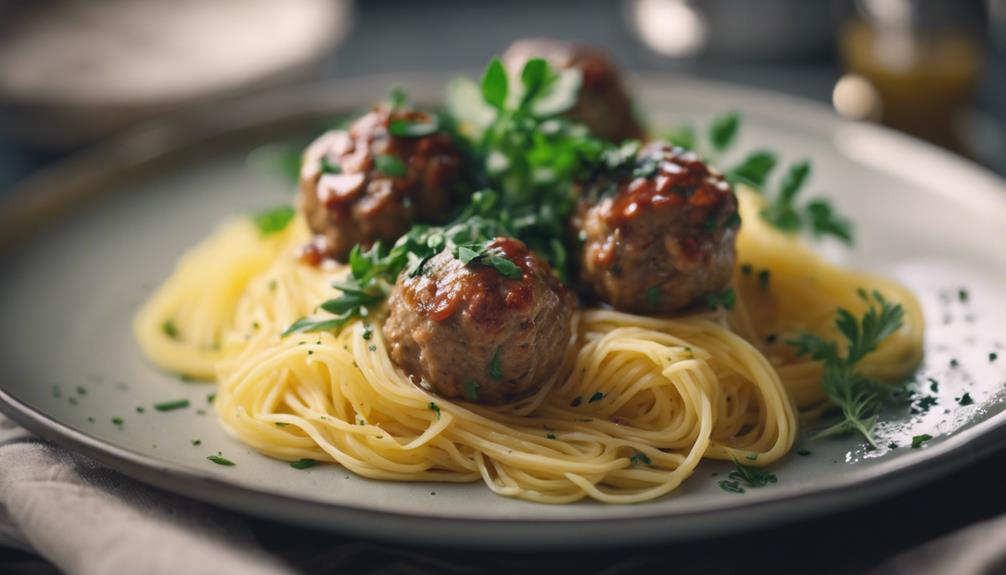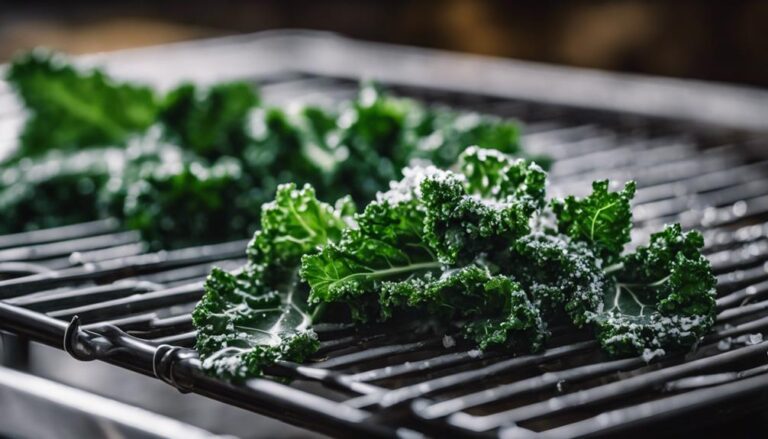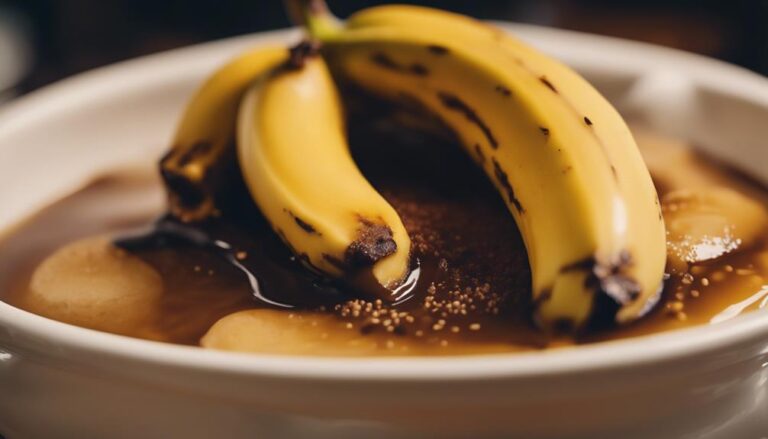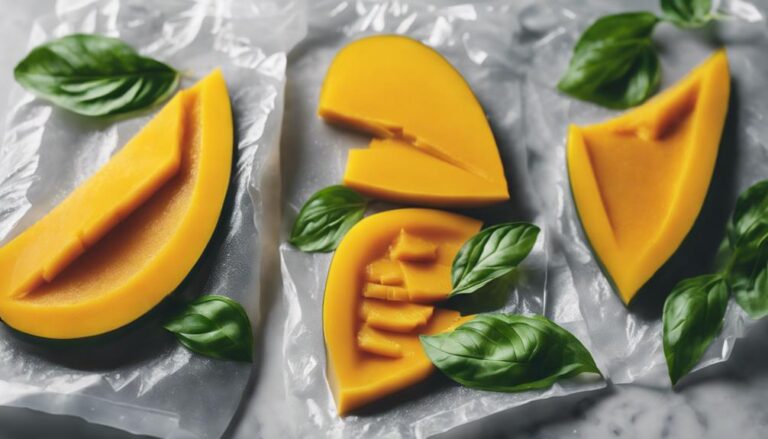Sous Vide Turkey Meatballs With Spaghetti Squash
Indulge in succulent Sous Vide Turkey Meatballs with spaghetti squash, a tender dish showcasing precision cooking. Set the sous vide water bath at 140°F for perfect tenderness. Guarantee turkey meatballs reach 165°F for safety. Experiment with spices like oregano and paprika for added flavor. Turkey meatballs offer a healthier twist to traditional meatballs. Enjoy the juicy meatballs with delicate spaghetti squash for a harmonious blend. Learn more about evolving meatball traditions and flavor combinations. Enhance your dining experience with the unique variations and precise cooking temperatures for a flavorful meal.
What You Will Learn Here
- Sous vide cooking ensures tender turkey meatballs.
- Spaghetti squash complements the flavors of turkey meatballs.
- Precision temperature control is crucial for safety and doneness.
- Experiment with herbs and spices for enhanced flavors.
- Enjoy the harmonious combination of juicy meatballs with delicate squash.
Turkey Meatball Origins
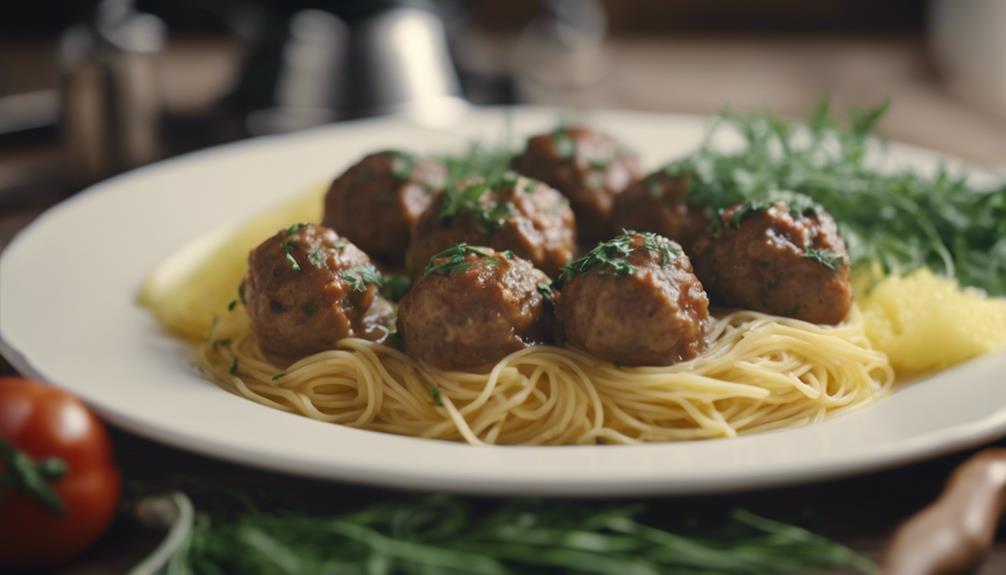
Turkey meatballs have a rich history that spans across various culinary traditions. The influence of different cultures has shaped the evolution of meatballs into the beloved dish that's familiar today.
Understanding the origins of turkey meatballs provides insight into the diverse world of food and cooking.
Turkey Meatball History
Originating in the Mediterranean region, meatballs have a long and varied history that reflects the diverse culinary traditions of different cultures. Turkey meatballs, a variation of this beloved dish, have their origins in the Ottoman Empire, where they were popularized as a staple in Turkish cuisine. Over time, these savory spheres of ground turkey have made their way into various global culinary adaptations, each adding a unique twist while still honoring the traditional flavors.
In many cultures, turkey meatballs have become an integral part of holiday traditions, often served during festive gatherings and celebrations. For example, in Italy, turkey meatballs are a common dish during Christmas feasts, symbolizing togetherness and abundance. Similarly, in Sweden, they're a favorite dish during the Christmas season, served with lingonberry sauce and pickled cucumbers. These holiday traditions not only showcase the versatility of turkey meatballs but also highlight the cultural significance and culinary creativity that have evolved over the years.
Culinary Traditions Influence
Influenced by diverse culinary traditions, meatballs have a rich history that showcases the blending of flavors and techniques from various cultures. Cultural influences have played a significant role in shaping the evolution of meatballs, with each region adding its unique twist to traditional recipes. From Italian polpette to Swedish köttbullar, these savory spheres of goodness have been adapted and transformed over the years.
Culinary techniques vary across cultures, with some opting for pan-frying, while others prefer baking or simmering in flavorful sauces. The use of herbs, spices, and binding agents also differs, contributing to the distinct taste and texture of meatballs worldwide. Traditional recipes have been passed down through generations, each family adding its touch to create a beloved dish.
Today, modern twists on classic meatballs can be found in fusion cuisine, where chefs experiment with unexpected flavor combinations and presentation. Despite these innovations, the essence of meatballs as a comfort food that brings people together remains at the heart of this beloved dish.
Evolution of Meatballs
As meatballs have evolved through diverse culinary traditions, the origins of turkey meatballs offer a unique twist on this beloved dish. Turkey meatballs have a rich history that reflects culinary innovations and cultural influences. While meatballs are often associated with Italian cuisine, the use of turkey as a primary ingredient brings a new dimension to this classic comfort food.
The concept of meatballs traces back to ancient Rome, where a mixture of ground meat, breadcrumbs, and spices was a common fare. Over time, different regions embraced this simple yet versatile dish, adapting it to suit local tastes and ingredients. Turkey meatballs emerged as a healthier alternative to traditional beef or pork varieties, appealing to modern dietary preferences.
Culinary innovations have further transformed turkey meatballs, with chefs experimenting with various herbs, seasonings, and cooking methods to enhance flavor and texture. Cultural influences have also played a significant role in shaping the evolution of turkey meatballs, incorporating diverse ingredients and techniques from around the world. Today, turkey meatballs continue to captivate food enthusiasts with their delicious taste and adaptability to different cuisines.
Meatball Seasoning Essentials
To enhance the flavor of your turkey meatballs, consider incorporating a blend of essential seasonings. When it comes to seasoning techniques and flavor combinations for your meatballs, here are five key ingredients you should consider adding to your recipe:
- Garlic Powder: Provides a savory depth of flavor without the harshness of fresh garlic.
- Onion Powder: Adds a subtle sweetness and enhances the overall taste profile of the meatballs.
- Dried Oregano: Infuses a Mediterranean flair with its earthy and slightly bitter undertones.
- Paprika: Offers a touch of smokiness and a vibrant red color to your meatballs.
- Crushed Red Pepper Flakes: Brings a hint of heat that elevates the flavor profile and adds excitement to each bite.
Turkey Meatball Variations
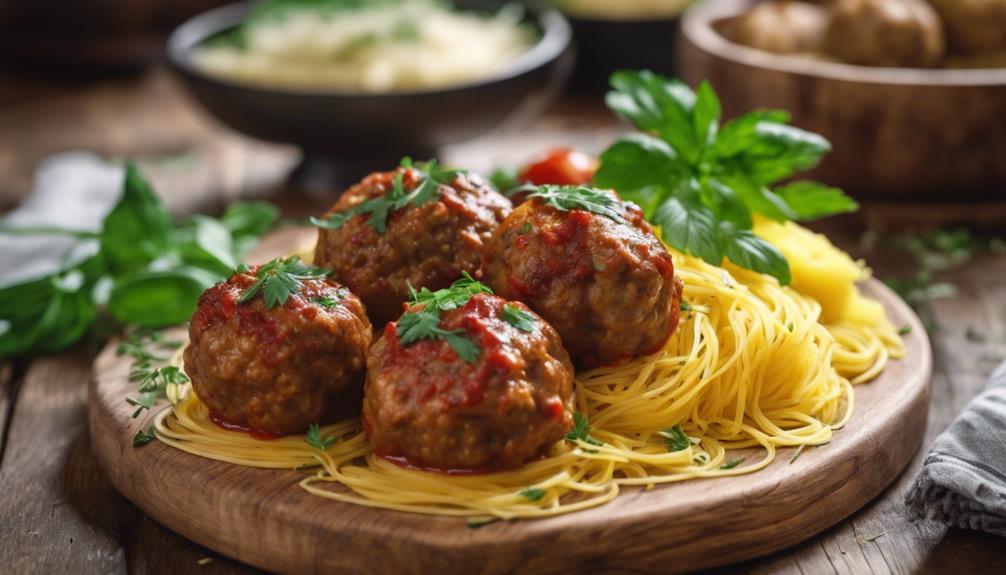
When it comes to turkey meatball variations, you have a few exciting options to explore.
Try the Sous Vide Turkey Meatballs Recipe for a tender and flavorful twist on the classic dish.
For a unique flavor profile, experiment with the Savory Cranberry Glaze Recipe or indulge in the crispy goodness of Parmesan Turkey Meatballs.
Sous Vide Turkey Meatballs Recipe
Consider experimenting with different spices and herbs to create unique variations of sous vide turkey meatballs. Here are some ideas to inspire your culinary creativity:
- Spicy Kick: Add cayenne pepper, paprika, and a touch of hot sauce for those who enjoy a bit of heat.
- Italian Twist: Combine basil, oregano, and garlic for a classic Italian flavor profile.
- Asian Fusion: Infuse soy sauce, ginger, and sesame oil to give your meatballs an Asian flair.
- Mediterranean Delight: Try mixing in cumin, coriander, and mint for a taste of the Mediterranean.
- Herbaceous Blend: Experiment with parsley, thyme, and rosemary for a fragrant and savory herb-infused meatball.
Savory Cranberry Glaze Recipe
For a flavorful twist on your sous vide turkey meatballs, try preparing a savory cranberry glaze that adds a hint of sweetness and tanginess to your dish. This festive glaze offers a unique twist to your holiday appetizers, elevating your turkey meatballs with its delightful flavor pairings.
Here are some tips to create this delicious glaze:
- Simmer fresh cranberries with balsamic vinegar for a rich, tangy base.
- Add a touch of honey to balance the tartness and enhance the sweetness.
- Incorporate a sprinkle of fresh thyme for an earthy undertone.
- Finish off with a pinch of salt to bring out all the flavors in harmony.
- Drizzle the glaze over your sous vide turkey meatballs and enjoy the burst of festive flavors.
Crispy Parmesan Turkey Meatballs
To create crispy Parmesan turkey meatballs, start by combining ground turkey with grated Parmesan cheese and breadcrumbs. Here are some tips to make your turkey meatballs extra delicious:
- Baked Meatball Alternatives: Instead of frying, try baking the meatballs for a healthier option with a crispy texture.
- Homemade Pasta Variations: Pair your Parmesan turkey meatballs with different pasta shapes like penne or fusilli for a fun twist.
- Vegetarian Meatball Options: For a vegetarian twist, consider substituting the ground turkey with lentils or chickpeas to create meatless meatballs.
- Asian Fusion Twists: Add some soy sauce, ginger, and garlic to the meatball mixture for an Asian-inspired flavor profile.
- Experiment with Flavors: Don't be afraid to add herbs like parsley or basil to enhance the taste of your turkey meatballs.
These variations can help you customize your crispy Parmesan turkey meatballs to suit your preferences and add excitement to your meal.
Cooking Temperature Recommendations
When cooking turkey meatballs sous vide, it's important to follow ideal cooking temperatures to guarantee food safety. Precision in cooking is key to achieving the perfect texture and flavor while maintaining the necessary safety standards.
Ideal Cooking Temperatures
Maintain precision by guaranteeing your cooking temperatures are accurately set to achieve the ideal doneness for your turkey meatballs. When using sous vide techniques, temperature control is essential for achieving perfect results. Set your sous vide water bath to 140°F (60°C) for tender and juicy turkey meatballs. This precise temperature allows the meat to cook gently, retaining its moisture and natural flavors.
Flavor infusion is another key benefit of sous vide cooking. By cooking your turkey meatballs at the ideal temperature, around 140°F (60°C), the flavors from herbs, spices, and seasonings infuse beautifully into the meat, creating a delicious and well-rounded taste profile. This controlled cooking environment ensures that every bite is packed with flavor.
Ensuring Food Safety
Guarantee the safety of your food by following recommended cooking temperature guidelines to prevent any risks of foodborne illnesses. Essential food handling is vital to avoid cross-contamination, where harmful bacteria can spread from one food to another. When using sous vide cooking, temperature control is key. The water bath should be set to the precise temperature needed to cook the food thoroughly and safely.
To prevent the growth of bacteria, make sure that your turkey meatballs reach an internal temperature of at least 165°F (74°C). Use a food thermometer to accurately measure the temperature. When preparing spaghetti squash, ensure it reaches an internal temperature of 205°F (96°C) to be fully cooked and safe to eat.
Avoid placing cooked food back onto the same plate that held raw meatballs and always wash your hands after handling raw ingredients. By following these temperature guidelines and practicing proper food handling techniques, you can enjoy delicious sous vide turkey meatballs with spaghetti squash while keeping your meal safe and free from harmful bacteria.
Precision in Cooking
To guarantee precise cooking and maintain food safety, always adhere to recommended temperature guidelines when using sous vide cooking techniques. Precision techniques are essential in sous vide cooking as they rely on maintaining precise temperatures to achieve consistent results. Cooking innovations like sous vide allow for controlled cooking environments that can help you achieve perfect doneness in dishes such as turkey meatballs with spaghetti squash.
When cooking turkey meatballs using the sous vide method, it's important to cook them at a precise temperature to ensure they're safe to eat. The recommended temperature for poultry like turkey is 165°F (73.9°C) to eliminate any harmful bacteria and pathogens. By using a sous vide precision cooker, you can set the water bath to the exact temperature needed and cook the turkey meatballs to perfection.
Final Thoughts
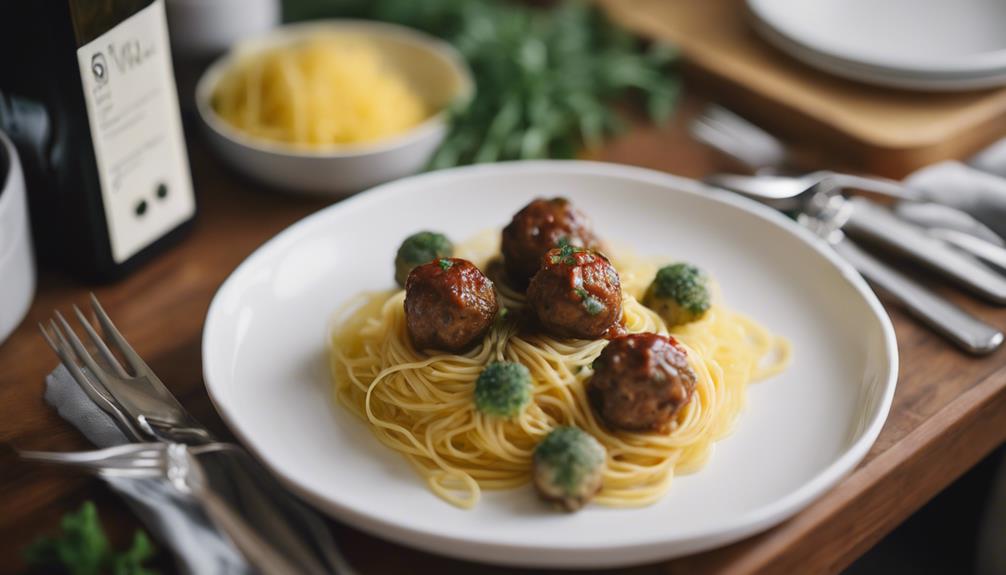
Consider reflecting on your experience preparing and enjoying this flavorful dish of sous vide turkey meatballs with spaghetti squash to fully appreciate the blend of flavors and textures. Culinary creativity shines through when experimenting with different herbs and spices to enhance the taste of the turkey meatballs. Whether you opted for a traditional Italian seasoning or decided to go bold with exotic flavors, each variation adds a unique touch to the dish.
Flavor experimentation is a key aspect of cooking that allows you to tailor recipes to your preferences. The sous vide method of cooking guarantees that the turkey meatballs are juicy and tender, perfectly complementing the light and delicate strands of spaghetti squash. As you savor each bite, take a moment to appreciate the effort put into creating a harmonious combination of ingredients.
Frequently Asked Questions
Can I Substitute Spaghetti Squash With Regular Pasta?
Yes, you can substitute spaghetti squash with regular pasta. While pasta alternatives offer variety, spaghetti squash benefits include being lower in calories and carbohydrates. It can provide a lighter, healthier twist to your dish.
How Long Can I Store Cooked Turkey Meatballs in the Fridge?
You can store cooked turkey meatballs in the fridge for about 3-4 days for best freshness and food safety. Be sure to seal them in an airtight container to maintain their quality and prevent early expiration.
Are There Any Gluten-Free Options for Meatball Binders?
When looking for gluten-free meatball binders, consider options like almond flour, tapioca starch, rice flour, or cornstarch. These ingredients work well as substitutes and can help you create delicious meatballs without gluten.
Can I Use Ground Chicken Instead of Turkey for the Meatballs?
Yes, you can use ground chicken instead of turkey for the meatballs. Ground chicken will bring a slightly different flavor to the dish but will still create a delicious meatball. Adjust the seasoning to enhance the meatball texture and flavor.
Is It Possible to Freeze the Cooked Turkey Meatballs for Later Use?
Yes, you can freeze the cooked turkey meatballs for later use. Make sure they are completely cooled before placing them in a freezer-safe container. To reheat, simply thaw in the fridge overnight and warm them up in the oven or microwave.
Conclusion
To sum up, sous vide turkey meatballs with spaghetti squash are a delicious and healthy option for a satisfying meal. By using the right seasoning and cooking at the recommended temperature, you can enjoy tender and flavorful meatballs every time. Experiment with different variations to find your favorite combination.
Whether you're looking for a low-carb option or just want to try something new, this dish is sure to impress your taste buds. Give it a try and enjoy a tasty and nutritious meal.
